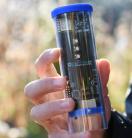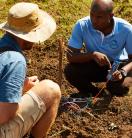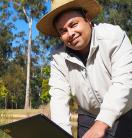Water management tools, methods scaled out in India
A new project in India will upscale technical innovations from previous ACIAR research to assist water management and drought mitigation in India.
Operating across the water-stressed regions of Odisha, Karnataka and Andhra Pradesh, the new initiative will help farmers and rural communities who depend on rainfall better manage water resources to become more resilient to extreme weather events like drought.
Smallholder farmers in these regions are highly vulnerable to rainfall variability and in recent years, record drought has forced the evacuation of whole Indian villages.
The project involves a course to share tools and methods developed through research projects with extension staff and ultimately farmers. By helping farmers implement these, the project partners hope farmers will be able to optimise water use, making their farms more productive and resilient.
Water Research Program Manager at ACIAR, Dr Robyn Johnston, said the project was an excellent example of scaling research and implementing in a practical way that maximises impact for smallholder farmers.
‘Water insecurity is a major development barrier for many rural communities in India and a real hindrance to maximising agricultural production.’
‘It’s rewarding to see innovations and methods developed through previous ACIAR investment now being scaled up with the Australian Water Partnership to assist our Indian research partners and to help rural communities better manage their water resources,’ Dr Johnston said.
The National Rainfed Area Authority, an expert body within India’s Ministry for Agriculture and Farmers Welfare, is coordinating the project. It is working with the three state governments, applied research institutions, universities both in India and Australia, NGOs and farmers to develop suitable frameworks and solutions to improve water management.
Among the project partners are ACIAR and the AWP, as well as CSIRO, Western Sydney University, South Australian Research & Development Institute (SARDI) in Australia and Watershed Support Service and Activities Network (WASSAN) based in India.
Dr Uday Nidumolu, CSIRO, is leading the development and delivery of the project.
He said initially researchers and extension officers from five large-scale agricultural development projects in rainfed areas of Odisha, Karnataka and Andhra Pradesh, would participate in the course. It is hoped the course will later be expanded.
The course will run over two years, with capacity-building workshops held twice a year. Each of these workshops will go for three days and will focus on a different theme: climate risk analysis, soil microbiology (linked to water use efficiency), strategic supplementary irrigation, and groundwater and aquifer management.
Under each of these themes, participants will learn about how to implement tools and methods that have been developed through Australian-supported research projects. They will also each receive a Chameleon Soil Water Sensor and related equipment to help with soil moisture monitoring.
Dr Nidumolu said participants would then use these research outputs in their projects.
‘The project evolved out of discussions about “scaling out” research outputs from long-standing India-Australia collaborations and other Australian research-for-development projects,’ he said.
‘CSIRO has been working on such projects for many years and we, together with our partners, have developed tools, methods and approaches that can help farmers optimise their use of water in rainfed systems.
‘This project takes a new approach by engaging with large-scale projects to help them integrate proven tools and methods thus leading to scale and impact.’
This ACIAR project is part of a bigger project funded by the Andhra Pradesh Government and International Fund for Agricultural Development (IFAD).
Dr Nidumolu said this project was also new in its approach of delivering the project in such a wide and rich partnership to achieve the common goal of improved water use in rainfed agriculture.
More than 70 people participated in the online inception meeting for the course on 25 November. The project is scheduled to run until September 2022.





